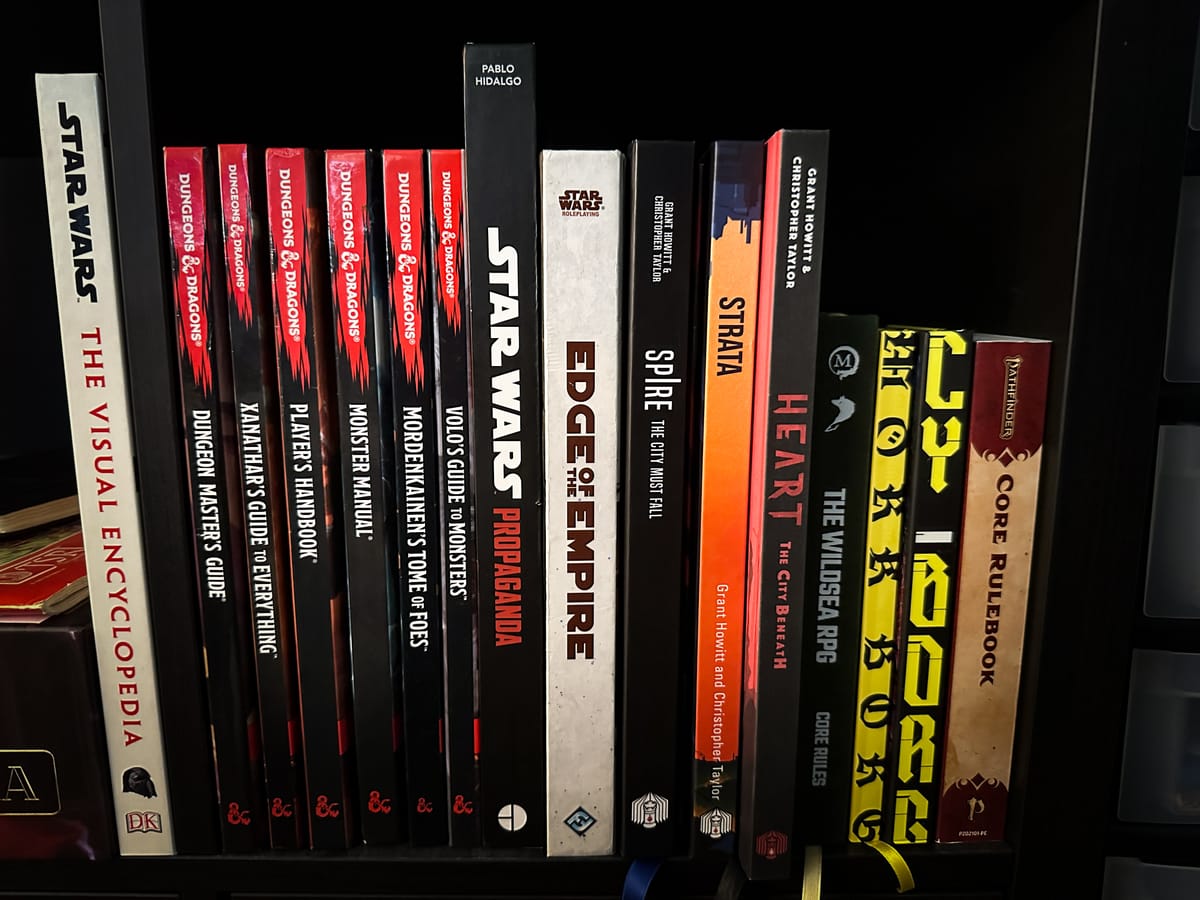Mindset and research
What made you think of making your own game?

With the introductions out of the way, let’s start from the beginning. Not the start of design, even before that. Like with any creative endeavour, in order to create an RPG, a supplement, or even a short homebrew, you need the right frame of mind if you intend to end up with something you can be proud of.
So, why are you doing this? What made you think of making your own game?
It could be one or more of number of things. You could just like writing, and prepping to GM your weekly game may just not be scratching enough of the itch. You may like making your own mechanics for traps, and weapons, and have so many ideas that just don’t fit within the scope of the game you are playing. Or, like a lot of people, you may be frustrated with the state of the most popular fantasy RPG to date, and think you could do it better.
All of those motivations, and more, are perfectly reasonable. Like a lot of things, if you focus solely on your passions throughout your project, then you are likely on the right track.
Now, this post isn’t simply here to tell you to “follow the voices in your head telling you to put pen to paper”. It’s mainly a setup for this advice:
Play. Games.
Before you begin writing I believe it is essential to play, and ideally GM, several different games, beyond the one we’re all likely thinking of. At an absolute minimum, I believe you should read them. Your motivations are pure, absolutely, but I would heavily advise that you expand your knowledge on what is out there before you put words on the page beyond a small summary of your goals.
By all means, if your experience is solely in 5e D&D, you can absolutely start. But you are limiting your sole source of inspiration to rolling a D20 and beating a target number, and there is so much more than that out there. That’s before we even consider that the game you want to make may already exist. This is fine, but it may cause you to rethink or be inspired in a different way to enhance that game in your own way. Or, like I am, it could lead to taking the bones of a system you like, and twisting it, and adding your own meat to them. The point being, you could be missing out on vital ‘aha!’ Moments by not broadening your foundational knowledge.
In an ideal world, you should research games with vastly different mechanics, themes, and settings.
If you have not ventured far from the 5e sphere yet, head to your local game store, pick up a couple of these games from the shelf that you think look cool, give them a read, make a character, pitch them to your game group, and try to give them a play. Even a oneshot, or just reading them, is going to give you a good idea of what other RPGs can do. This will build that knowledge base and also let you feel what games should be like at the table. Don’t worry about layout or technical stuff for now, think about how it feels.
Now, for some quick recommendations if you are just used to D&D 5E, some other absolute classics, that are relatively well known, but are a good introduction to what else is out there:
- Blades in the Dark - a game in a world inspired by an industrial fantasy themed Victorian London, where you play broken scoundrels seeking fortune and favour
- Thousand Year Old Vampire - a solo journalling RPG that sees you take on the role of a classic vampire
- Mork Borg & Cy_Borg - a demonstration in gorgeous art, with a mad, rules lite system that plays like a heavy metal show
- Ironsworn & Ironsworn: Starforged - another couple of solo RPGs, but with more classic fantasy and sci-fi feels
- Vaesen - a game with a classic ruleset, where you play investigators of nordic myths
These are a great place to start. Relatively well known with decent sized communities, but with varied enough classic mechanics, that they can get you used to what RPGs truly can be. Other than this, your game store, or itch.io can be a great source for weird and wonderful RPGs made by small indie creators, so take some time scouting out ones that are in the theme that you think you want to go down, and get inspired.
Certainly, there is no need to read or buy all of these. But one or two is going to give you a feel for what is out there outside of WOTC’s premier RPG property.
So, now that you have expanded your knowledge of RPGs (or not, if the case may be) and you have the mindset of just wanting to create, for creations sake, to reach a goal you are excited about, it’s time to actually think about designing.
Let’s take what you know from your gaming experience, and put that into the melting pot of ideas in your head, and think of what you want to create, what problems you want to fix, what stories you want players of your game to tell, and follow us on our journey to creating our own. To do that, we need to look at the scary bit. Originality.
